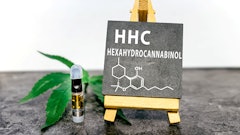
The U.S. Court of Appeals for the Fourth Circuit ruled Sept. 4 that THC-O acetate, commonly referred to as just THC-O, meets the legal definition of hemp under the 2018 Farm Bill.
This decision refutes the Drug Enforcement Administration’s declaration in a February 2023 letter sent to international cannabis lawyer Rod Kight that THC-O is a Schedule I controlled substance.
THC-O is a semi-synthetic analogue that’s derived from tetrahydrocannabinol (THC)—either from a cannabis or hemp plant—through a chemical process using acetic anhydride, according to renowned cannabis and endocannabinoid researcher Dr. Ethan Russo. THC-O can be multiple times more potent than delta-9 THC, one of the main psychoactive components of cannabis.
RELATED: THC-O Acetate Q&A with Dr. Ethan Russo: ‘Don’t Go There'
Since THC-O is derived from delta-9 or delta-8 THC and does not occur naturally in the cannabis plant, the DEA’s 2023 interpretation is that it does not fall under the definition of hemp.
Similarly, the DEA determined that “all synthetically derived tetrahydrocannabinols,” such as delta-8 THC and THC-O, “remain Schedule I controlled substances” in its Interim Final Rule from August 2020.
However, the U.S. Ninth Circuit Court of Appeals first rejected the DEA’s interpretation in May 2022, when a federal judge applied the DEA’s argument to delta-8 THC in a trademark infringement and copyright dispute between AK Futures LLC and Boyd Street Distro LLC in Nevada.
The court considered “whether the possession and sale of delta-8 THC is permitted under federal law and, consequently, whether a brand used in connection with delta-8 THC products may receive trademark protection under federal law.”
The Ninth Circuit ruled that it didn’t need to consider the DEA’s interpretation of synthetically derived substances like delta-8 THC because the definition of hemp under the 2018 Farm Bill is “unambiguous and precludes a distinction based on manufacturing method” and that the Farm Bill’s definition applies to “all such downstream products so long as they do not cross the 0.3 percent delta-9 THC threshold.”
The Ninth Circuit also ruled that “clear statutory text overrides a contrary agency interpretation,” such as the interim final rule from the DEA.
On Sept. 4, the Fourth Circuit Court applied many of the same considerations in a case stemming from a North Carolina resident, Tonya Anderson, getting fired from her job with Diamondback Investment Group LLC for failing two drug tests.
Anderson claimed her firing violated state law for her use of purportedly lawful hemp-derived products to treat her anxiety and muscle spasms during work hours. She sued Diamondback for disability discrimination, citing a violation of the Americans with Disabilities Act.
To rebut Anderson’s assertion that every hemp-derived product she took was legal, Diamondback argues that at least one of the products, which contained THC-O, was illegal at the time Anderson was employed.
Specifically, Diamondback cited as support the DEA’s same interim final rule in which Boyd Street—a smoke shop accused of selling counterfeit banded e-cigarettes and vaping products containing delta-8 THC—sought to rely upon to defend itself in the Ninth Circuit.
The Fourth Circuit held on Sept. 4 that “The Ninth Circuit rejected this same argument as it applied to delta-8 THC.”
The Fourth Circuit Court’s presiding judges wrote, “Between the DEA’s February 2023 letter and AK Futures [vs. Boyd Street], we think the Ninth Circuit’s interpretation of the 2018 Farm [Bill] is the better of the two. And we’re free to make that determination ourselves, despite a contrary interpretation from the DEA, because we agree with the Ninth Circuit that [the 2018 Farm Bill] is unambiguous.”
The Fourth Circuit’s ruling that THC-O meets the legal definition of hemp is the first such ruling involving a hemp-related case since the U.S. Supreme Court overturned what’s commonly referred to as the Chevron Doctrine: a 1984 case that required federal courts to defer to federal government agencies’ interpretations of ambiguous statutes.
Federal agencies’ interpretation of an ambiguous statute is “given controlling weight unless they are arbitrary, capricious, or manifestly contrary to the statute,” according to the Chevron Doctrine.
The Supreme Court overturned the Chevron Doctrine in a June 2024 decision for Loper Bright Enterprises vs. Raimondo, Secretary of Commerce.
This means federal courts, like the Fourth Circuit, no longer need to weigh a federal agency’s interpretation of a statute, such as the DEA’s interpretation of the Farm Bill. The June 2024 decision is for both ambiguous and unambiguous statutes.
“Even if [the 2018 Farm Bill] were ambiguous, we needn’t defer to the [DEA’s] interpretation,” according to the Fourth Circuit’s Sept. 4 ruling.
Kight, the attorney at the receiving end of the DEA’s 2023 letter, said the Fourth Circuit Court’s ruling was unexpected.
Kight pointed out a line from the ruling stating that the court finds that the DEA’s interpretation of synthetically derived tetrahydrocannabinols related to the Farm Bill lacks the “power to persuade.”
“Ouch,” he wrote in his “Kight on Cannabis” blog last week. “I’m confident the DEA did not like reading that line. But that’s not all. The court kept going and continued to disparage the DEA’s interpretation of the Farm Bill.
“The court was clear and even forceful in its message that the DEA’s positions on hemp will not get special treatment by the courts. Instead, when interpreting the Farm Bill, courts will rule in favor of the most ‘reasonable’ interpretation, even if that interpretation is contrary to the DEA’s position.”
The Fourth Circuit ruling that THC-O meets the legal definition of hemp has implications that extend to other interpretations of the Farm Bill, said Kight, who maintains that the DEA’s interpretation of tetrahydrocannabinolic acid’s (THCA) legal status is wrong.
RELATED: THCA in the Farm Bill: Amendment Goes Far Beyond Closing ‘Loopholes’
The only statutory metric under federal law for determining whether harvested cannabis material is lawful hemp or illegal cannabis is its delta-9 THC levels (not THCA or total THC), according to Kight.
Still, the future of the hemp industry is contingent mainly upon how federal lawmakers define hemp in the Farm Bill’s reauthorization, which Sen. Chuck Grassley, a member of the Senate Agriculture Committee, said last month he believes will get extended to 2026.


























